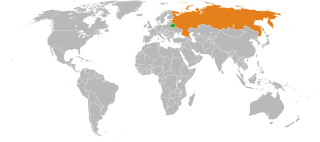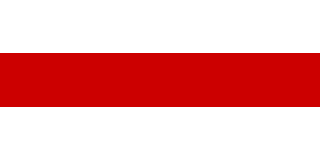| |||||
| Decades: | |||||
|---|---|---|---|---|---|
| See also: | |||||
| |||||
| Decades: | |||||
|---|---|---|---|---|---|
| See also: | |||||
Ongoing: Belarusian involvement in Russian invasion of Ukraine; Belarus–European Union border crisis

Belarus, officially the Republic of Belarus, is a landlocked country in Eastern Europe. It is bordered by Russia to the east and northeast, Ukraine to the south, Poland to the west, and Lithuania and Latvia to the northwest. Covering an area of 207,600 square kilometres (80,200 sq mi) and with a population of 9.1 million, Belarus is the 13th-largest and the 20th-most populous country in Europe. The country has a hemiboreal climate and is administratively divided into six regions. Minsk is the capital and largest city; it is administered separately as a city with special status.
The mass media in Belarus consists of TV, radio, newspapers, magazines, cinema, and Internet-based websites/portals. The media is monopolized by the government, which owns all TV channels, most of the radio and print media. Broadcasting is mostly in Russian, and Russian media are widely present. After 2020, all independent media were pushed out of the country. The Law on Mass Media has been repeatedly amended and tightened, making it virtually impossible for independent journalists and publications to operate. European, Ukrainian and news websites were blocked in Belarus. The Constitution of Belarus guarantees freedom of speech, but this is contradicted in practice by repressive and restrictive laws. Arbitrary detention, arrests, and harassment of journalists are frequent in Belarus. Anti-extremism legislation targets independent journalism, including material considered unfavourable to the president. As of 2023, Belarus ranks 157th in the World Press Freedom Index. BBC describes the Belarusian media environment as one of the most repressive in Europe.

Alexander Grigoryevich Lukashenko is a Belarusian politician who has been the president of Belarus since the office's establishment in 1994. This makes him the longest-serving European president.

The state flag of Belarus is a red-green bicolour with a red-on-white ornament pattern placed at the hoist (staff) end. The current design was introduced in 2012 by the State Committee for Standardisation of the Republic of Belarus, and is adapted from a design approved in a May 1995 referendum. It is a modification of the 1951 flag used while the country was a republic of the Soviet Union. Changes made to the Soviet-era flag were the removal of communist symbols – the hammer and sickle and the red star – as well as the reversal of the colours in the ornament pattern. Since the 1995 referendum, several flags used by Belarusian government officials and agencies have been modelled on this national flag.

The Union State of Russia and Belarus, officially also referred to as Union State, is a supranational union consisting of Belarus and Russia, with the stated aim of deepening the relationship between the two states through integration in economic and defence policy. Originally, the Union State aimed to create a confederation; however, both countries currently retain their independence.

Belarus elects on national level a head of state—the president—and a legislature. The president is elected for a five-year term by the people. The National Assembly has two chambers. The House of Representatives has 110 members elected in single-seat constituencies elected for a four-year term. The Council of the Republic has 64 members, 56 members indirectly elected and eight members appointed by the president.

Freedom Day is an unofficial holiday in Belarus celebrated on 25 March to commemorate the declaration of independence by the Belarusian Democratic Republic by the Third Constituent Charter on that date in 1918. It is also known as the 25-aha sakavika day.

The Constitution of the Republic of Belarus is the ultimate law of Belarus. The Constitution is composed of a preamble and nine sections divided into 146 articles.

The president of the Republic of Belarus is the head of state and head of government of Belarus. The office was created in 1994 with the passing of the Constitution of Belarus by the Supreme Council. This replaced the office of Chairman of the Supreme Council as the head of state. The tasks of the president include executing foreign and domestic policy, defending the rights and general welfare of citizens and residents, and upholding the Constitution. The president is mandated by the Constitution to serve as a leader in the social affairs of the country and to act as its main representative abroad. The duties, responsibilities and other transitional clauses dealing with the presidency are listed in Chapter Three, Articles 79 through 89, of the Constitution.

Belarus and Russia share a land border and constitute the supranational Union State. Several treaties have been concluded between the two nations bilaterally. Russia is Belarus' largest and most important economic and political partner. Both are members of various international organizations, including the Commonwealth of Independent States, the Eurasian Economic Union, the Collective Security Treaty Organization, and the United Nations.

Belarus and Lithuania established diplomatic relations on 24 October 1991, shortly after the dissolution of the Soviet Union. The two countries share 680 kilometres (420 mi) of common border. Lithuania's border with Belarus is the country's longest border. For Belarus it is its 3rd-longest border.

The Belarusian opposition consists of groups and individuals in Belarus seeking to challenge, from 1988 to 1991, the authorities of Soviet Belarus, and since 1995, the leader of the country Alexander Lukashenko, whom supporters of the movement often consider to be a dictator. Supporters of the movement tend to call for a parliamentary democracy based on a Western model, with freedom of speech and political and religious pluralism.

Belarusian nationalism refers to the belief that Belarusians should constitute an independent nation. Belarusian nationalism began emerging in the mid-19th century, during the January Uprising against the Russian Empire. Belarus first declared independence in 1917 as the Belarusian Democratic Republic, but was subsequently invaded and annexed by the Russian Soviet Federative Socialist Republic in 1918, becoming part of the Soviet Union. Belarusian nationalists both collaborated with and fought against Nazi Germany during World War II, and protested for the independence of Belarus during the late 1980s and early 1990s.

Gitanas Nausėda is a Lithuanian politician, economist, and banker who is serving as the ninth and incumbent president of Lithuania since 2019. Born in Klaipėda, Nausėda graduated from Vilnius University with an economics degree in 1987. He was director of monetary policy at the Bank of Lithuania from 1996 to 2000 and chief economist to the chairman of SEB bankas from 2008 to 2018.
Events in the year 2020 in Belarus.

Sviatlana Hieorhiyeuna Tsikhanouskaya is a Belarusian political activist. After standing as a candidate in the 2020 presidential election against the president Alexander Lukashenko, she has led the political opposition to his authoritarian rule through an oppositional government operating from Lithuania and Poland.

The Coordination Council for the Transfer of Power is a non-governmental body created by presidential candidate Sviatlana Tsikhanouskaya to facilitate a democratic transfer of power in Belarus. The council, founded during the 2020 Belarusian protests in response to the disputed 2020 Belarusian presidential election, has 64 core members with a 7-member leadership presidium.

Nexta is a Belarusian media outlet that is primarily distributed through Telegram and YouTube channels. The YouTube channel was founded by then 17-year-old student Stsiapan Putsila. The channel's headquarters are located in Warsaw, Poland, after its founder went into exile.
Parliamentary elections were held in Belarus on 25 February 2024. The country elected 110 deputies to the lower house of parliament and about 12,000 representatives of local councils.